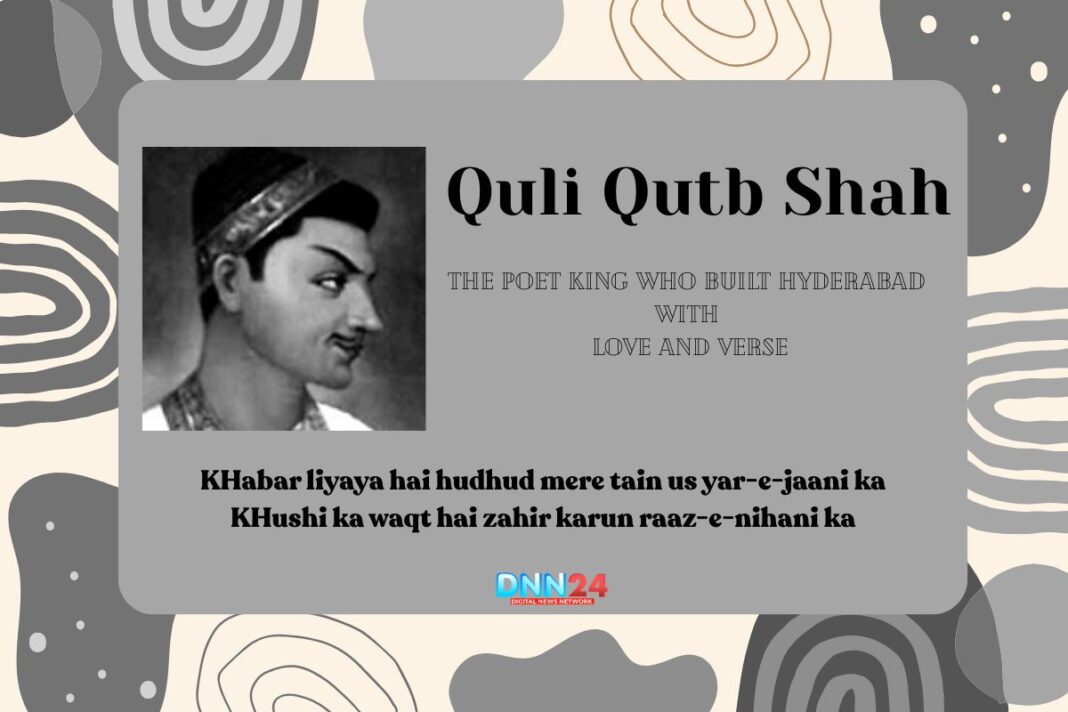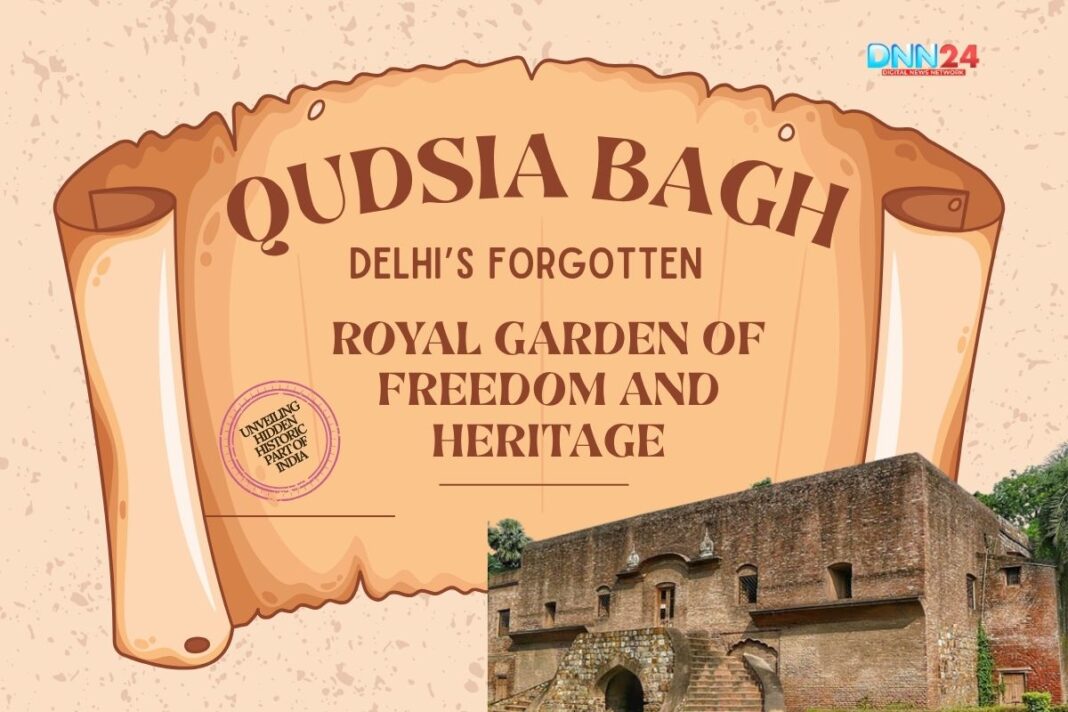Muhammad Quli Qutb Shah came into this world on 4 April 1565, as the third son of Ibrahim Quli Qutb Shah and Maharani Bhagirathi. Picture this: a fifteen-year-old boy suddenly finding himself responsible for an entire kingdom. Hyderabad was not even born yet, and young Quli had to face rebellions, family politics, and huge expectations from everyone around him. His mother was a Hindu princess, and this gave him something special.
‘Qutub’ Shah, na de muj deewane ko pand
Quli Qutb Shah
deewane koon kuch pand diya jaaye na
He learned to appreciate different cultures, languages, and traditions from childhood itself. But life was not easy for him. His father faced constant political turmoil, and his brothers and sisters were often treated like pawns in power games. Young Quli experienced pain and betrayal at a very early age. Instead of becoming bitter, he turned to poetry. He would write his thoughts on mango leaves and stones near the River Musi.
piyan baaj pyala piya jaaye na
Quli Qutb Shah
piyan baaj yak-til jiya jaaye na
During his most difficult days, when he watched the old city becoming crowded and unhealthy, he wrote his famous line: “Make my city full of people, like you keep the river full of fish.” This prayer stayed with him as he worked on building what would become Hyderabad. His childhood struggles taught him compassion, and his mixed heritage gave him the vision to create a city where different communities could live together peacefully.
Nabi sadqe Qutub Shah dil mein keeta
Quli Qutb Shah
mohabbat Haidar-e-Karrar ehdaas
Bhagmati: The Woman Who Inspired a City
The story of Quli Qutb Shah and Bhagmati remains one of the most beautiful and debated tales in Indian history. Legend tells us that Quli fell in love with Bhagmati at a young age. She was a dancer from Chinchalam village, located across the Musi River. Every single evening, Quli would risk his life crossing the flooding river to see her. He did not care about the disapproving looks from his courtiers and religious scholars.
main na janu Kaaba-o-butkhana-o-maikhana koon
Quli Qutb Shah
dekhta hoon har kahan dasta hai tujh mukh ka safa
In those times, society had stringent rules about who could love whom. Their romance was considered shocking because she came from a simple background. But Quli did something extraordinary. He named the first settlement ‘Bhagnagar’ after her, and later this became Hyderabad. Some people say he designed the entire city keeping her memory alive in every street and structure. Modern historians continue to debate whether Bhagmati actually existed or if she was merely a romantic legend.
mohabbat ki sultani hai sab jagat mein
Quli Qutb Shah
ki is sam nahin koi gyani-o-dani
But for the people of Hyderabad, what matters is Quli’s courage. He loved her openly and honoured her by naming a royal city after her. His poems about her show deep vulnerability: “Flowers bloom, even where shadows fall, because my city, my love, fills the space in between.” The Charminar and the old bazaars still carry the spirit of this love story, making Hyderabad not just a city but a monument to emotional bravery.
piya ki yaad soon peeta hoon main mai
Quli Qutb Shah
hamara haal kya jaanenge sukhzaad
Fighting Battles Outside and Inside the Palace
Quli Qutb Shah never enjoyed a peaceful reign. His throne was constantly under threat from multiple directions. He had to personally fight against rebellious commanders, such as Ali Khan Loor and Yashwant Raj, who wanted to break away from his kingdom. In 1592, someone claiming to be his deceased brother appeared, supported by powerful nobles and foreign allies, attempting to seize the throne.
madan mast badal mast kajan mast pari mast
Quli Qutb Shah
hui mast pawan mast lagan mast pari mast
The city itself saw violent riots when Quli took tough decisions to remove Mughal supporters and their allies. These actions made him unpopular with certain groups and cost him many sleepless nights. But his biggest struggle was internal and emotional. He felt torn between two worlds. On one side, he loved the mixed culture of Deccan, where Hindus and Muslims lived together, sharing festivals and languages.
karen taqat ganwa kar abidan maikhana koon sajda
Quli Qutb Shah
kya zunnar mein tasbeeh dekhan roo-e-zebara
On the other hand, there was constant pressure to adhere to strict Persian and Mughal traditions. Every poem he wrote became an act of rebellion. Quli chose to write in the language that ordinary people spoke on the streets. He blended Telugu, Persian, and old Dakhni Urdu, creating something entirely new.
hamara sajan KHush-nazar baz hai
Quli Qutb Shah
to us dil mein sab ishq ka raaz hai
Court scholars called his work “unpolished” and criticised him for not adhering to classical rules. But Quli did not stop. He wrote in a way that captured the sound of his city, incorporating local dialects and everyday slang. He celebrated common struggles in his verses: “If my words are not sweet, it is because my wounds still bleed.” Very few kings in history have chosen to appear less sophisticated to connect with their people.
tere darsan ki main hun sain mati
Quli Qutb Shah
muje lawo piya chhati sun chhati
Building Monuments of Stone and Emotion
Quli Qutb Shah left behind two kinds of monuments. The first kind you can see and touch: he founded Hyderabad in 1591 with careful planning. The Charminar stood at the centre, with wide roads, beautiful gardens, mosques, and busy markets spreading outward like branches of a tree. But his second monument lives in words and feelings. He wrote around 50,000 verses in Persian, Urdu, and, sadly, some lost Telugu poems.
pyari ke nainan hain jaise kaTare
Quli Qutb Shah
na sam us ke ange koi hain do dhaare
His poetry explored themes such as wine, pain, society, longing, urban planning, and love. He became the first Dakhni poet whose complete collection encompassed various styles, including marsiya, masnavi, ghazal, and rubai. Each verse carried the marks of his personal wounds. He wrote about fighting natural disasters, dealing with disgruntled citizens, facing political adversaries, and coping with personal grief. Still, his poems overflow with hope and sometimes even joy. His prayer for Hyderabad continues to move people even today, centuries after his death.
tuman raushni bin haman raushni nah
Quli Qutb Shah
tu didar bin sabhi didar hain kah
Despite facing conquest attempts, dealing with prejudice, and surviving personal betrayals, Quli Qutb Shah showed that kings could be human too. He made emotion respectable and permanent, just like any fort or palace. Today, Hyderabad’s true soul reflects its vision: languages mix freely, religions coexist, and passions find expression without fear. The city stands as living proof that one ruler’s poetic heart can shape culture for generations. Quli Qutb Shah demonstrated that authentic leadership entails building with compassion, not just with bricks and mortar.
Also Read: Deep Narayan Nayak: Teacher of the Street Who Turned Walls into Blackboards
You can connect with DNN24 on Facebook, Twitter, and Instagram and subscribe to our YouTube channel.



